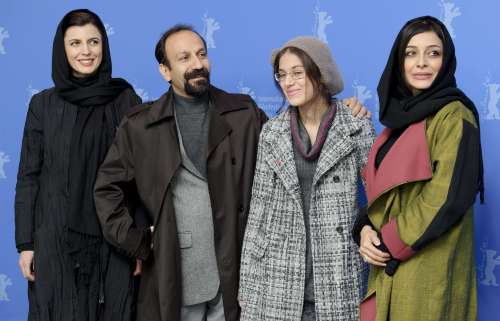BERLIN (AFP) ― A warmly applauded Iranian drama emerged Tuesday as a front-runner at the Berlin film festival, which is throwing the spotlight on the country’s embattled film-makers.
“Nader and Simin: A Separation” by Asghar Farhadi, who won a best director prize for his haunting film “About Elly” at the 2009 festival, brings another fascinating portrait of contemporary Iranian urbanites to the screen.
It tells the story of a woman who wants to divorce so she can take her 11-year-old daughter to live outside Iran, telling a judge that “no girl should have to grow up in this situation.”
Her request is refused so Simin and her husband Nader agree to an informal separation, with their daughter staying with her father. But he has his own father to care for, who is suffering from Alzheimer’s disease.
So to help him at home, Nader hires a young pregnant woman, who keeps her employment secret from her husband. The decision proves fateful when she has a miscarriage at work that her family blames on Nader.
“Nader and Simin: A Separation” by Asghar Farhadi, who won a best director prize for his haunting film “About Elly” at the 2009 festival, brings another fascinating portrait of contemporary Iranian urbanites to the screen.
It tells the story of a woman who wants to divorce so she can take her 11-year-old daughter to live outside Iran, telling a judge that “no girl should have to grow up in this situation.”
Her request is refused so Simin and her husband Nader agree to an informal separation, with their daughter staying with her father. But he has his own father to care for, who is suffering from Alzheimer’s disease.
So to help him at home, Nader hires a young pregnant woman, who keeps her employment secret from her husband. The decision proves fateful when she has a miscarriage at work that her family blames on Nader.

Each character is thrust into a wrenching moral conflict over the child’s death, which Farhadi said was a way of looking at a struggle between traditional religious principles and the new standpoint of a modernizing class.
“It’s a crisis of human beings nowadays and the question of morals,” he told reporters and critics, some of whom gave him a standing ovation as he entered the press conference.
“We’re comparing what we’re doing with the standards of the past. Those moral standards can no longer be directly applied, so there’s no standard that you can use as a reference for your actions.
“A modern person with a modern life has a lot of conflicts, therefore I think people are looking for a new definition of morals.”
This year’s festival, one of the world’s top cinema showcases, has highlighted the work of dissident Iranian directors and invited the most prominent among them, Jafar Panahi, to serve on its jury.
However an Iranian court in December handed Panahi a six-year jail sentence and a 20-year film-making ban and though he is free on bail, he is barred from travelling abroad.
Panahi was convicted of illicit propaganda for working on a film about unrest after the disputed re-election of Iranian President Mahmoud Ahmadinejad in June 2009.
On the opening night of the festival, the jury led by Italian-American actress and director Isabella Rossellini left one seat vacant for Panahi, who won a Silver Bear prize for his comedy “Offside” in 2006.
Farhadi said he and his fellow film-makers deeply regretted Panahi’s absence in Berlin.
“You are familiar with him because of his films but I know him personally,” he told reporters.
“I said goodbye to him when I came here. I was extremely saddened because I was leaving for a place where he couldn’t go and all directors around the world feel the same way.”
He said the crackdown on directors in Iran had had the paradoxical effect of spurring their creative ambition.
“I think Iranian film-makers today must be a little more clever than others,” he told AFP.
The Berlinale, as the event is known, is screening “Offside” and another four of Panahi’s award-winning pictures such as “The Circle” and “Crimson Gold” as a tribute, introduced by Iranian directors and actors.
On Thursday, the festival was due to hold a panel discussion entitled “Censored Cinema” with Iranian film-makers and artists on “censorship, and the restriction of freedom of opinion and expression in Iran.”
Film-makers, writers and artists have complained of increased censorship under Ahmadinejad’s presidency.








![[Kim Seong-kon] Democracy and the future of South Korea](http://res.heraldm.com/phpwas/restmb_idxmake.php?idx=644&simg=/content/image/2024/04/16/20240416050802_0.jpg&u=)







![[KH Explains] Hyundai's full hybrid edge to pay off amid slow transition to pure EVs](http://res.heraldm.com/phpwas/restmb_idxmake.php?idx=652&simg=/content/image/2024/04/18/20240418050645_0.jpg&u=20240418181020)

![[Today’s K-pop] Zico drops snippet of collaboration with Jennie](http://res.heraldm.com/phpwas/restmb_idxmake.php?idx=642&simg=/content/image/2024/04/18/20240418050702_0.jpg&u=)